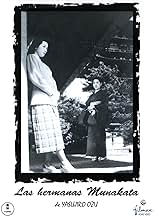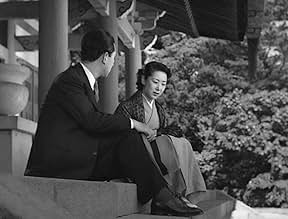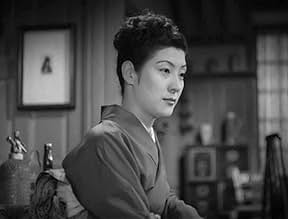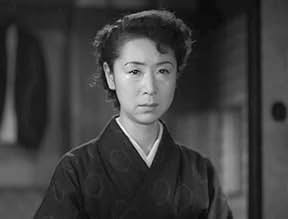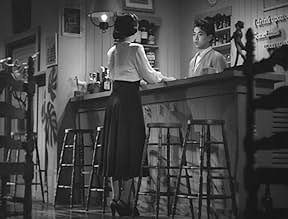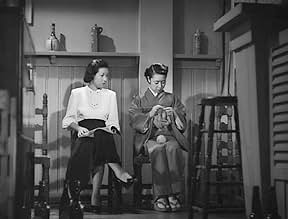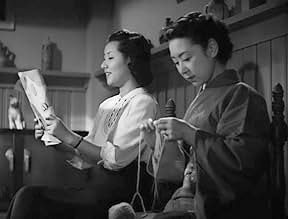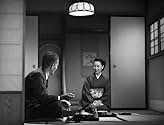Füge eine Handlung in deiner Sprache hinzuSetsuko is unhappily married to Mimura, an engineer with no job and a drinking habit. She's always been in love with Hiroshi, but he left for France years ago without proposing. Now he is ba... Alles lesenSetsuko is unhappily married to Mimura, an engineer with no job and a drinking habit. She's always been in love with Hiroshi, but he left for France years ago without proposing. Now he is back and Mariko (Setsuko's sister) tries to reunite them, although secretly she loves him to... Alles lesenSetsuko is unhappily married to Mimura, an engineer with no job and a drinking habit. She's always been in love with Hiroshi, but he left for France years ago without proposing. Now he is back and Mariko (Setsuko's sister) tries to reunite them, although secretly she loves him too.
- Regie
- Drehbuch
- Hauptbesetzung
- Auszeichnungen
- 2 wins total
Empfohlene Bewertungen
I just love Hideko Takemine in this film. She plays Mariko, the plucky younger Munekata sister who likes baseball more than temples, sticks her tongue out when she hears something she doesn't like, smokes from time to time, and speaks her mind freely about things she's frustrated with. She represents shifting cultural values and a more outspoken generation of younger women, which was really nice to see, particularly as it gave such life to this film.
Her older sister is Setsuko (Kinuyo Tanaka), who is devoted to her husband (So Yamamura) despite the fact that he's a lazy, unemployed drunk. She runs a bar, but is struggling to stay afloat financially, and moreover, has discovered that her father (Chishu Ryu) has less than a year to live. She was actually romantically interested in another man 15 years previously, Hiroshi (Ken Uehara), but only realized the depth of feelings when she got engaged, and he'd already gone away to France.
Well, Hiroshi is now back, which sets in motion a melodrama, as Mariko begins developing feelings for him, Setsuko's husband begins suspecting that his wife may be having an affair with him, and there is a third woman in the picture as well, a friend he made while in France (Sanae Takasugi). Having read her sister's old diary, Mariko would actually love for Setsuko and Hiroshi to be together, but can't help herself from playfully flirting with him too (and at one point, outright proposing to him, I mean, how the hell did he resist that?). Meanwhile, the husband is quite a tool, coolly (and unfairly) judging his wife while stroking a cat, and slapping her hard across the face seven times in case we couldn't hate him more.
It's often difficult to arrive at a satisfactory ending in such film, as emotionally we know what we want, but that path could be viewed as formulaic and not very artistic. I have to say, the route Ozu chose here wasn't very satisfying to me either, and I was almost tempted to reduce my review score, but had enjoyed it up until that point.
Some of the better scenes are when the sisters debate one another, even if it is expository, such as when Mariko questions her sister's marriage and Setsuko replies, "You're too young ... to understand marriage. It's not always a good time. Holding back is what keeps us going. That's how it is," to which Mariko says bluntly, "Then marriage is stupid." After Mariko has referred to her as outdated, Setsuko chastises her: "What doesn't become outdated is up-to-date. Things that are truly up-to-date are those that never get old. ... Your idea of up-to-date is skirt lengths going from long to short. If everyone has red nails, yours absolutely must be red too, no?"
With the ensuing tolerant fatherly advice for both young women to be themselves and how Setsuko's husband ultimately treats her, it seems there is a progressive message here, which I really enjoyed seeing from Ozu. Through signs we often see in English, including one for Coca Cola, he's reminding us of a changing world in Japan, but seeming to say that somehow it's going to be alright. Meanwhile in transitions between scenes, he gives us beautifully composed images, like clouds floating over hills or trains trundling by, the world impassive to the drama of these little lives.
It's Takemine's film, however. Her character is full of vitality, at times pretending to be a pompous narrator of romantic scenes, acting as a ballerina she's just seen, giving birdcalls to a nightingale with her father, or dancing around the room after tricking the other woman into thinking Hiroshi's left. She's played beautifully played by Takemine, who I'd watch in just about anything.
I've had the privilege to watch his films chronologically, from "The Only Son" to the last film he made, so I can notice that there was a big change from his (in that time) previous film "Late Spring" to his subsequent one "Munekata Sisters" and practically different from his other previous ones in general. Although the subject matter in this film is more romantic and dramatic in comparison to his previous films, as I just mentioned, his filmmaking style remains the same, the static camera and his beautiful close-ups are still there. Also another interesting thing to say is that this film resembles Mizoguchi's themes, he could have easily done this one of his films if he'd had the chance.
I might get the readers bored for repeating myself, but you can rest assured this is another essential film from Ozu you surely should get your hands on if possible.
Also this may be the last time I review one of Ozu's films, not because I don't like his other films, but because you simply can't go wrong with him, you either get his filmmaking or not. If you get it, then you'll probably love most of his films; therefore, you should really watch all you can get from him.
My score: 9.2/10
The film revolves around the relationship between older sister Setsuko (Kinuyo Tanaka) and her younger sibling Mariko (Hideko Takamine). Setsuko is more reserved and adheres to traditional Japanese values, while Mariko embraces modern trends and enjoys sassing people. Naturally, their personality differences bring them into conflict.
Takamine gives a fantastic and genuinely funny performance as Mariko, which is light-years different from the reserved heroines played by Setsuko Hara in Ozu's more acclaimed films. She does funny voices, sticks out her tongue, and even dismissively flicks a suit of samurai armor. (I assume that's a big no-no in polite society.) Yet underneath all this joking is a sensitive character who loves her older sibling, despite their obvious personality clashes.
By contrast, it's initially easy to overlook Tanaka as Setsuko. But as the film goes on, Setsuko's struggle with a loveless marriage starts to dominate the plot, and her character becomes compelling.
Speaking of the plot, it contains more romantic melodrama and unexpected twists than usual for Ozu - possibly because it's based on a serialized story, rather than an original creation. But Ozu directs it with his usual sensitivity and prevents the material from becoming corny or saccharine. Ozu also makes effective use of his graceful transitional or "pillow" shots in this film, which are even more beautifully composed than usual.
Some viewers (understandably) dislike the film's unusual ending. I won't spoil it here, but suffice to say that I actually liked it, and indeed thought it was the most honest way to resolve the story. Ultimately, this film is about two sisters who are very different people but very committed to each other, and the ending does justice to their relationship and its place in the story.
I was a fan of Ozu for 20 years before I bothered to check this out - because, who ever talks about The Munekata Sisters? (Its lack of U. S. availability didn't help, but it's on the Criterion Channel now.) Imagine my surprise when I discovered that this is a witty, wise movie that rounds out Ozu's filmography quite nicely. It's not an all-time great like Late Spring, sure, but a movie doesn't need to be a legendary classic to be awesome.
Wusstest du schon
- WissenswertesThis was the first film made by star actress Kinuyo Tanaka after her triumphant months-long visit to the United States. Allegedly, Tanaka, from her recent contacts with Hollywood actors, was full of new ideas about acting, which she was not shy about sharing with her director, Ozu. The latter, who held his own very strong (and very un-Hollywood) ideas about acting, was reportedly not pleased by this, and relations between the two during filming were thus somewhat tense.
- VerbindungenFeatured in Die Eleganz der Madame Michel (2009)
Top-Auswahl
- How long is The Munekata Sisters?Powered by Alexa
Details
Box Office
- Weltweiter Bruttoertrag
- 332 $
- Laufzeit1 Stunde 52 Minuten
- Farbe
- Sound-Mix
- Seitenverhältnis
- 1.37 : 1
Zu dieser Seite beitragen


